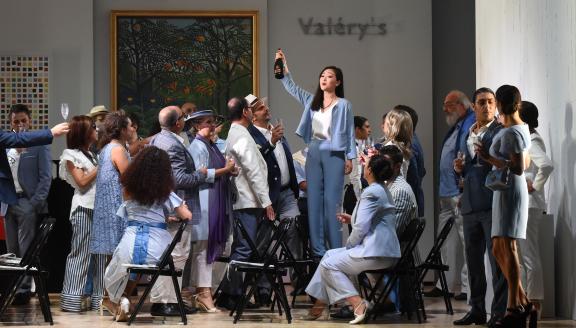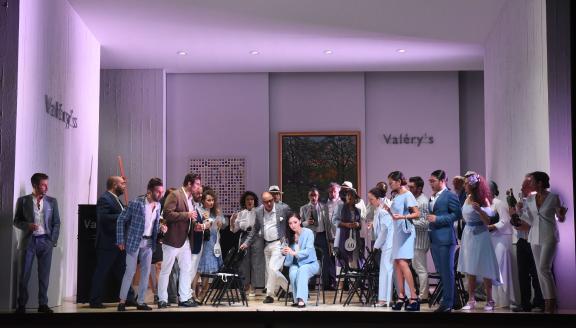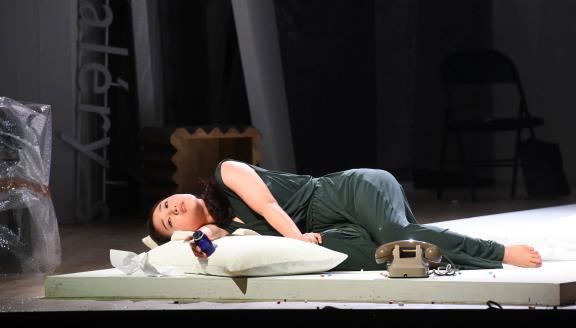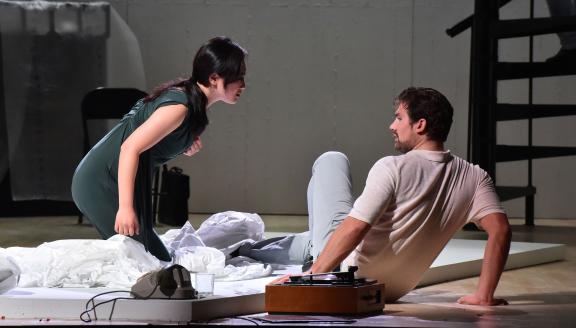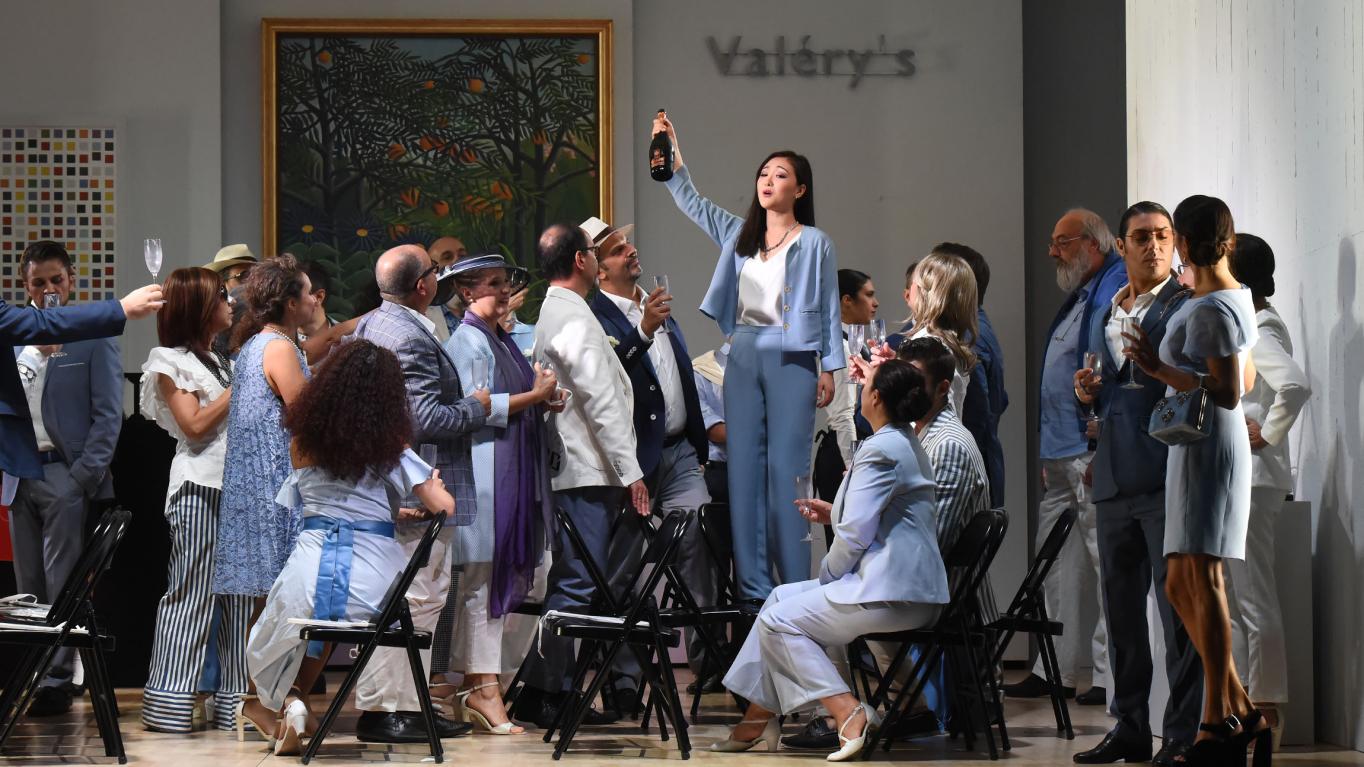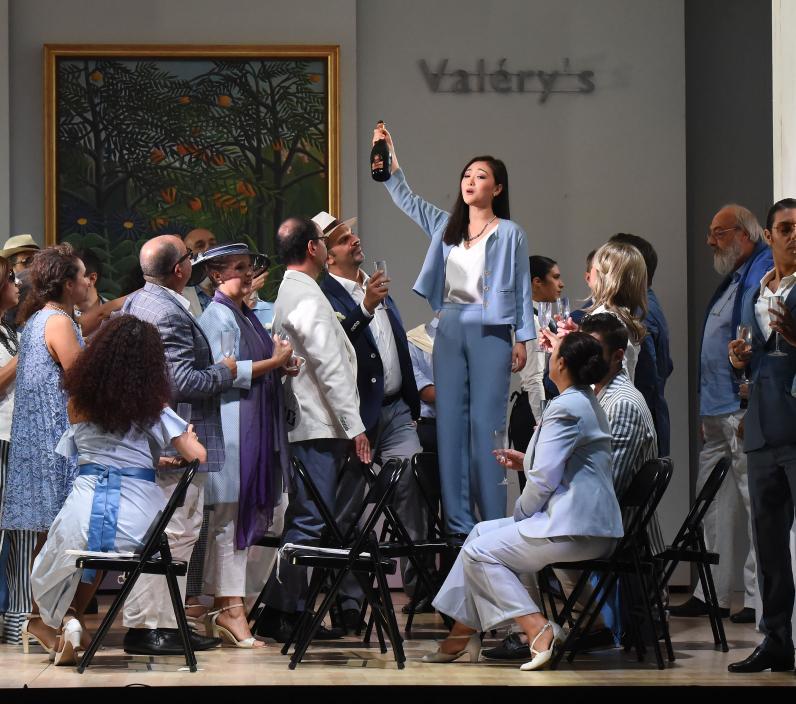

La traviata
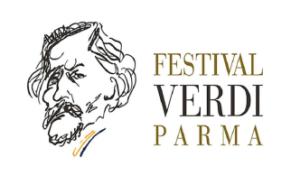
Erleben Sie eine der größten Liebesgeschichten aller Zeiten auf der Opernbühne, wie sie ein preisgekröntes Team von jungen Künstlern umsetzt.
Besetzung
|
Violetta Valéry
|
Isabella Lee
|
|---|---|
|
Alfredo
|
Alessandro Viola
|
|
Flora Bervoix
|
Marta Leung
|
|
Annina
|
Luisa Tambaro
|
|
Giorgio Germont
|
Marcello Rosiello
|
|
Gastone de Letorières
|
Paquale Scircoli
|
|
Barone Douphol
|
Carlo Checchi
|
|
Marchese d'Obigny
|
Claudio Levantino
|
|
Dottor Grenvil
|
Gerard Farreras Gonzáles
|
|
Giuseppe, Violetta's servant
|
Ugo Rosati
|
|
Flora's servant
|
Sandro Pucci
|
|
Komissionär
|
Raffaele Constantin
|
|
Chor
|
Teatro Comunale di Bologna
|
|
Orchester
|
Teatro Comunale di Bologna
|
| ... | |
|
Musik
|
Giuseppe Verdi
|
|---|---|
|
Musikalische Leitung
|
Sebastiano Rolli
|
|
Inszenierung
|
Andrea Bernard
|
|
Bühne
|
Andrea Bernard, Alberto Beltrame
|
|
Kostüme
|
Elena Beccaro
|
|
Text
|
Francesco Maria Piave.
|
|
Chorleitung
|
Andrea Faidutti
|
| ... | |
Video
Handlung
La Traviata ist die Chronik einer vorhergesagten Tragödie. Sie ist auch der Bericht von einem Aufstieg, einem Fall und einer Erlösung. Aber noch so viel mehr als das – sie ist die Geschichte einer Liebe größer als Vorurteile, größer als die Gesellschaft, größer als das Leben.
Akt 1 ist eine Party in der Wohnung der Kurtisane Violetta Valéry in Paris. Noch immer kommen Gäste dazu. Gaston erzählt Violetta, dass der junge Alfredo Germont in sie verliebt ist. Alfredo wird dazu überredet ein Trinklied anzustimmen (“Libiamo, ne’ lieti calici”) anstelle ihres verärgerten Liebhabers Baron Douphol. Eine Musikkapelle sagt einen Tanz an, aber Violetta bleibt zurück. Alfredo, der ihre Blässe bemerkt, bedrängt sie ihr zügelloses Leben aufzugeben und gesteht ihr seine Liebe (“Un di felice”). Sie macht sich über ihn lustig, ist aber innerlich von seiner Liebeserklärung berührt. Einige der Gäste kommen zurück, und Alfredo wird weggeschickt mit der Bitte, er möge wieder kommen, wenn die Kamelie, die sie ihm schenkt, verblüht sei. Die Party ist vorbei, und Violetta nun alleine. Sie grübelt über die Wirkung Alfredos Liebe (“Ah, fors’è lui”). Aber sie entscheidet sich im Hier und Jetzt zu leben, trotz des Echos von Alfredos Zeugnis seiner Liebe (“Sempre libera”).
Akt 2 beginnt drei Monate später in Violettas Landhaus. Sie und Alfredo leben mittlerweile zusammen. Seine Fröhlichkeit (“De’ miei bollenti spiriti”) wird jäh unterbrochen, als die Dienerin Annina ihm berichtet, sie habe den Verkauf des Wagens der Herrin arrangiert. Er bricht sofort nach Paris auf, um selbst Geld zu verdienen. Violetta kommt herein und schlägt eine Einladung ihrer Freundin Flora Bervoix aus. Ein Fremder wird angekündigt. Es ist Alfredos Vater, der sich in den Kopf gesetzt hat, sie zu überzeugen, seinen verlorenen Sohn zu verlassen. Sie beschreibt ihm, was sie alles für ihn aufgegeben hat. Als Germont ihr sagt, dass die Liaison die Ehe seiner Tochter gefährdet, protestiert sie und sagt, sie habe nicht mehr lange zu leben. Aber er bleibt hartnäckig, und sie findet sich mit dem Opfer ab und bittet nur, dass er seiner Tochter und auch Alfredo erst nach ihrem Tod davon erzählt (“Dite alla giovine”). Wieder allein schreibt sie einen Brief an Alfredo, dass sie beschlossen hat zu Douphol zurückzukehren. Plötzlich erscheint Alfredo. Sie bittet ihn, sie weiterhin zu lieben, und tritt ab (“Amami, Alfredo”). Der Diener sagt ihm, sie sei nach Paris gegangen, und er empfängt den Brief. Sein Vater kommt zurück um ihn zu trösten (“Di Provenza”), doch er ist fest entschlossen ihr zu folgen.
Später an diesem Abend hören die Gäste in Floras Stadthaus von der Trennung von Violetta und Alfredo. Gaston unterhält die Gäste. Alfredo kommt und beginnt zu spielen, dann kommt eine völlig verzweifelte Violetta mit Douphol. Ein Streit zwischen den beiden Männern wird dadurch verhindert, dass das Abendessen angesagt wird. Violetta bittet Alfredo um ein Gespräch unter vier Augen, Sie lügt ihn an, dass sie Douphol liebt, und er erniedrigt sie öffentlich, indem er ihr seine Gewinne zu Füßen wirft. Sein Vater kommt herein und tadelt ihn wegen seiner Grausamkeit.
Akt 3 findet sechs Monate später in Violettas Pariser Wohnung statt. Violetta stirbt an Tuberkulose. Der Arzt gibt ihr zwar Hoffnung, aber sagt Annina, dass das Ende nahe sei. Violetta liest immer und immer wieder einen Brief von Germont, der Alfredos Rückkehr verspricht. Aber es ist zu spät, und sie verzweifelt an ihren Träumen (“Addio del passato”). Draußen findet gerade ein Karneval statt, und Alfredos überraschende Rückkehr wird verkündet. Für eine kurze Weile sind sie wieder vereint (“Parigi, o cara”). Violetta klammert sich verzweifelt an ihr Leben, aber ihre Kräfte schwinden. In Gegenwart eines reuigen Germont schenkt sie Alfredo eine Miniatur von sich und stirbt.
Einblicke
This production of La traviata has been realised by Andrea Bernard (stage director), Alberto Beltrame (set designer) and Elena Beccaro (costume designer), the winners of the European Opera Directing Prize 2016.
The European Opera Directing Prize is awarded by Camerata Nuova (http://camerata-nuova.com/) to help launch the carreer of young opera directors. In the following video, you can see how the finalists work on their production ideas for La traviata.
LA TRAVIATA, the auction of feelings
Thoughts from the director Andrea Bernard
Da questo palpito s'io t'ami impara, senza te esistere più non potrei (Let my emotion show you how much I love you, I could not live without you) - Alfredo, III act
This sentence in particular, sung by Alfredo to Violetta in the third act, has made me wonder about the importance of love relationships in the life of a person of today. We often hear about people who are unable to be alone; who, once they have terminated a relationship, are already looking for another. When this happens, where is the border between love for each other and selfishness?
This and other questions prompted me to read La traviata through the eyes of today’s individual, as did Verdi with his contemporaries before the intervention of censorship (which pushed back the setting to the 17th century). In an ever more individualistic world, is Alfredo and Violetta’s love true or is it only the manifestation of an affection they feel compelled to feel, to prove a point to themselves and to the rest of society?
Alfredo sees not just Violetta the woman, but also a gateway to high society, and he feels the need to prove to himself that he can do it even if he comes from a different social background. He pursues this ambition until the end and accepts, perhaps with only half-sincere regrets, Violetta’s premature death.
Frank and cynical Violetta is a woman who has successfully climbed the career ladder and answers to no one, and who has made sacrifices in order to reach her objectives. This has made her popular and surrounded by rich and influential men. Behind this strength lies insecurity due to an illness that pushes her away from everything and everyone. This illness becomes even stronger if considered as psychological, sustained by the medicines Violetta will stop taking and which will leave her in a state of non-being; of quasi-death.
She hopes that her love for Alfredo will be an opportunity for redemption, a way to show that she too is able to feel those emotions that make people fulfilled.
Sometimes people bluff: they fake and self-delude and profess love, but they do all this only to fill their feelings of emptiness. Thus, the love between Violetta and Alfredo becomes a selfish act. They commodify their relationship; they are using one another for sheer personal gain.
The only one to make the two face reality is Giorgio Germont. His arrival provokes a deep crisis for the couple, making them understand that their relationship is based on shaky foundations. At the end of the day, ‘man is often voluble’. So what would happen after the falling-in-love phase? Would they really be suited to each other? Germont himself, afraid to be alone and maybe to shield his son from an experience he might have lived when he was young, will try his best to impede the relationship.
This aspect of ‘commodification of feelings’ has driven our decision to set the scene in a contemporary auction house: a place of power, exchange, vain ambition and desire. The auction house is a changing space where art and feelings collide. As objects are evaluated and put up for auction, so are emotions. The quality and substance of an object are not as important here as how high a monetary value the buyer will place on it. The auction house becomes a symbol: a sort of emotional mask which shows others what the wearer wants to present.
